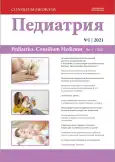Selection of a topical drug for the treatment of BHSA-negative tonsillopharyngitis in children
- Authors: Radtsig E.I.1, Evsikova M.M.1, Kukes I.V.2, Raikina E.V.3, Brilliantova V.V.3
-
Affiliations:
- Pirogov Russian National Research Medical University
- International Association of Clinical Pharmacologists and Pharmacists
- Dmitriy Rogachev National Medical Research Center of Pediatric Hematology, Oncology and Immunology
- Issue: No 1 (2021)
- Pages: 53-56
- Section: Articles
- URL: https://journal-vniispk.ru/2658-6630/article/view/71102
- DOI: https://doi.org/10.26442/26586630.2021.1.200664
- ID: 71102
Cite item
Full Text
Abstract
Introduction. Inflammation of the mucous membrane and lymphoid structures of the oropharynx (tonsillopharyngitis – TP) occurs frequently in paediatric practice, both against the background of acute respiratory infection and outside catarrhal manifestations. The main focus of the medical treatment of TP is on the indications for systemic antibacterial agents, and the choice of pathogenic and/or symptomatic agents is not strictly regulated and is left to the discretion of the physician. At the same time data on anti-inflammatory activity of different topical drugs for local treatment of TP are practically absent, though inflammatory process affects oropharyngeal mucosa, which is a part of mucosal immunity system (NALT-level MALT system) and can be of different genesis and connected to formation of different cytokines (both pro- and anti-inflammatory).
Objective. To determine cytokine levels in patients with acute TP (ATP) before and after administration of various topical medicines used for the treatment of ATP.
Materials and methods. Patients diagnosed with uncomplicated ATP over 3 years of age who agreed to be examined, treated and biomaterial (scraped oropharyngeal mucosa) were included in the study. All patients underwent routine ENT examinations, a rapid test for BHSA-positive TP and biomaterial sampling for proinflammatory cytokines. Patients included in the study were randomly allocated into 2 groups: Group 1 patients used benzidamine and Group 2 patients used benzyl dimethyl ammonium chloride monohydrate. Both drugs are indicated for the treatment of ATP in patients over 3 years of age and are available in the form of a throat spray.
Results. Forty-nine patients with BHSA-negative ATP were included. Forty-five of them received benzidamine and 24 received benzyl dimethyl ammonium chloride monohydrate by random assignment (both drugs were applied to the oropharyngeal mucosa). There was a significant reduction in the proinflammatory cytokine interleukin (IL)-1 in patients in whom benzidamine was used compared to the group of patients where benzildimethyl ammonium chloride was used. A similar trend was detected in the analysis of the proinflammatory cytokine IL-6. A marked decrease in the level of IL-8 under the influence of benzidamine compared to benzildimethyl ammonium chloride was also observed. The general dynamics of the proinflammatory cytokine level reduction was traced at the evaluation of the tumour necrosis factor α level.
Conclusion. The data obtained suggest that the use of benzidamine has a more pronounced anti-inflammatory effect. This aspect is important for the practitioner (otorhinolaryngologist, paediatrician) when choosing a topical drug for the treatment of TP, especially at the first symptoms of the disease.
Full Text
##article.viewOnOriginalSite##About the authors
Elena I. Radtsig
Pirogov Russian National Research Medical University
Author for correspondence.
Email: Radtsig_e@rsmu.ru
ORCID iD: 0000-0003-4613-922X
D. Sci. (Med.), Prof.
Russian Federation, MoscowMarina M. Evsikova
Pirogov Russian National Research Medical University
Email: Dr.marina.e@gmail.ru
ORCID iD: 0000-0002-7694-058X
Graduate Student
Russian Federation, MoscowIlia V. Kukes
International Association of Clinical Pharmacologists and Pharmacists
Email: ilyakukes@gmail.com
ORCID iD: 0000-0003-1449-8711
Cand. Sci. (Med.)
Russian Federation, MoscowElena V. Raikina
Dmitriy Rogachev National Medical Research Center of Pediatric Hematology, Oncology and Immunology
Email: e_raikina@inbox.ru
ORCID iD: 0000-0002-7634-2053
Cand. Sci. (Med.)
Russian Federation, MoscowVarvara V. Brilliantova
Dmitriy Rogachev National Medical Research Center of Pediatric Hematology, Oncology and Immunology
Email: Varvara-br@list.ru
ORCID iD: 0000-0003-0079-7761
Research Officer
Russian Federation, MoscowReferences
- Баранов А.А., Намазова-Баранова Л.С., Лобзин Ю.В., и др. Острый тонзиллит у детей. Клинические рекомендации. М.: Союз педиатров России, 2016; с. 24 [Baranov AA, Namazova-Baranova LS, Lobzin YuV, et al. Acute tonsillitis in children. Clinical guidelines. Moscow: Union of Pediatricians of Russia, 2016; p. 24 (in Russian)].
- Клинические рекомендации НМАО. Острый тонзиллофарингит. М., 2016 [Clinical guidelines of NMAO. Acute tonsillopharyngitis. Moscow, 2016 (in Russian)].
- Stewart AG, Beart PM. Inflammation: maladies, models, mechanisms and molecules. Br J Pharmakol 2016; 173: 631–4. doi: 10.1111/bph.13389
- Geißle K, Weigel C, Schubert K, et al. Cytokine production in patients with recurrent acute tonsillitis: analysis of tonsil samples and blood. Sci Rep 2020; 10 (1): 13006. doi: 10.1038/s41598-020-69981-1
- Skovbjerg S, Roos K, Olofsson S, et al. High Cytokine Levels in Tonsillitis Secretions Regardless of Presence of Beta-Hemolytic Streptococci. J Interferon Cytokine Res 2015; 35 (9): 682–9. doi: 10.1089/jir.2014.0123
- Deutsch E, Kaufman M, Nisman B, Barak V. Cytokine evaluation in throat infections. Ann OtoI RhinoI Laringol 1998; 107 (8): 713–6. doi: 10.1177/000348949810700815; PMID: 9716876
- Leão SC, Leal IO, Rocha HM, Rodrigues TM. Evaluation of cytokines produced by β-hemolytic streptococcus in acute pharyngotonsillitis. Braz J Otorhinolaryngol 2015; 81 (4): 402–7.
Supplementary files











